If you buy through our links, we may earn an affiliate commission. This supports our mission to get more people active and outside.Learn about Outside Online's affiliate link policy
The 5 Best Skis for Intermediates and Bargain Hunters
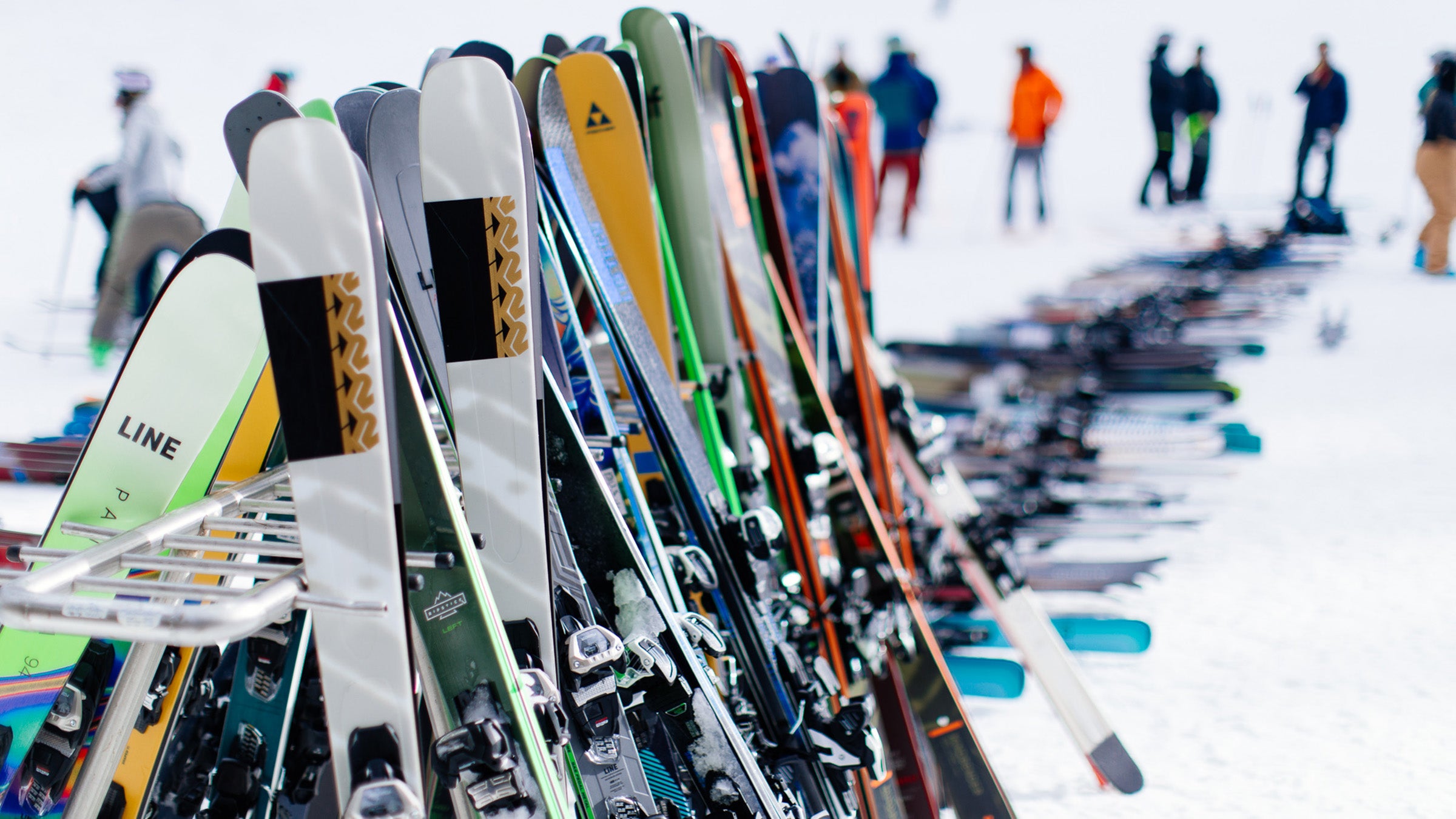
We partnered with the experts at SKI to test and find the year's best skis for intermediates. (Photo: Ray J Gadd)
Table of Contents
You’ve moved past the rental line and are ready to buy your first pair of skis—but with so many options out there, it’s easy to feel overwhelmed. Good news: there’s no such thing as a bad ski anymore. But there is such a thing as the wrong ski for your ability level.
If you’re still working on technique and building confidence, skip the stiff, high-performance models that top the list of expert reviews. The best skis for intermediate skiers are designed to be forgiving, stable, and easy to turn—helping you progress faster and have more fun on the mountain. They’re also priced more affordably and often come with bindings included, lowering the barrier to entry for this expensive sport.
To help you find the best ski to build your skills and confidence on the slopes, we teamed up with the experts at SKI—who test more than 150 models each season—to round up the best intermediate skis of 2026.
Best Skis for Intermediates at a Glance
- Editors’ Choice: Dynastar M-Cross 78 Express ($650)
- Most Versatile: Atomic Maverick 84 ($600)
- Best for Women: Rossignol Arcade W 80 ($650)
- Best Ski to Grow With: K2 Mindbender 85 ($600)
- Best for Carving: Rossignol Arcade 80 ($650)
More Women’s Skis We Recommend
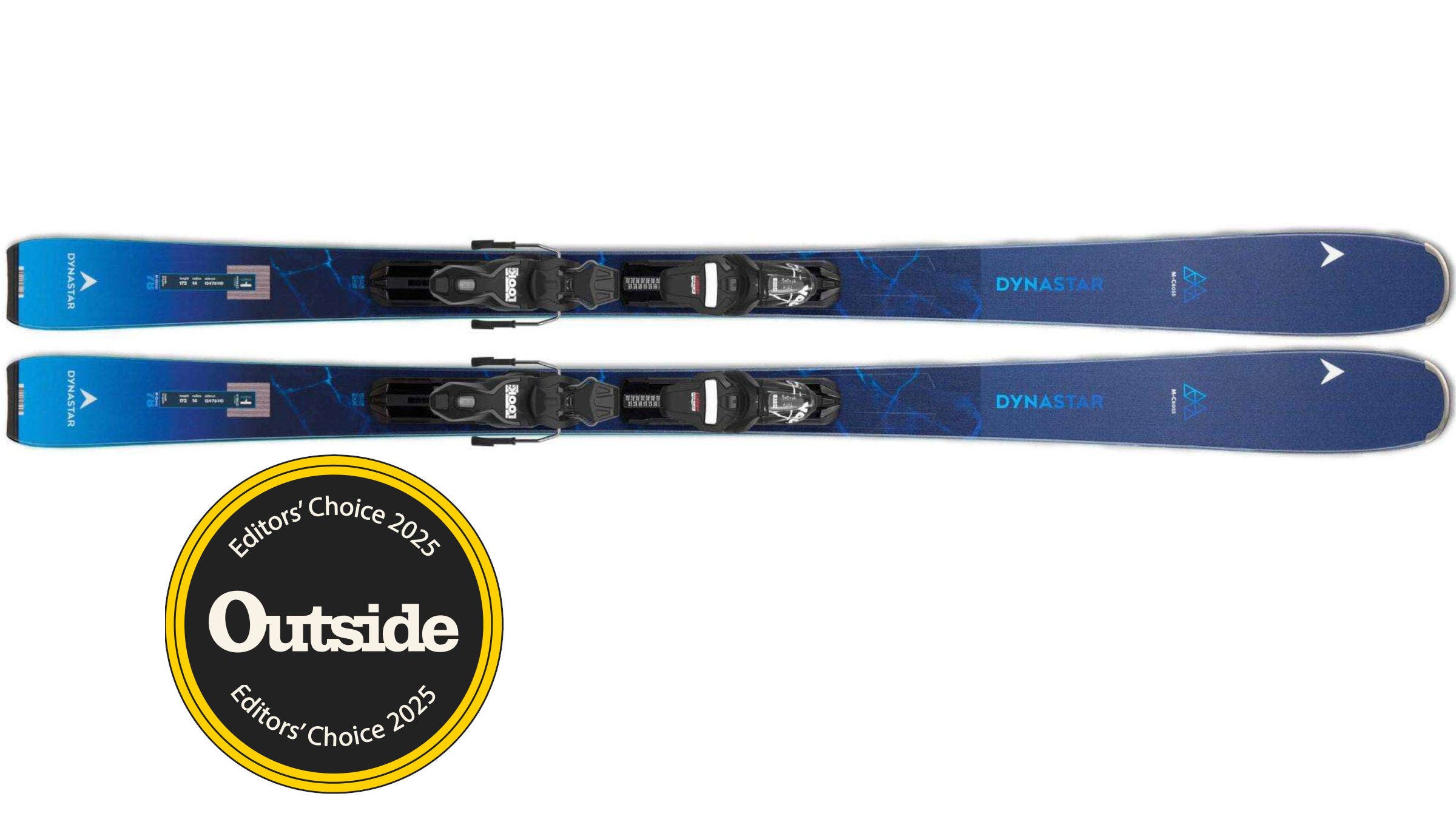
Editors’ Choice
Dynastar M-Cross 78 Express
Lengths: 148, 156, 164, 172, 178 cm
Dimensions: 124-78-110 mm
Pros and Cons
+ Large sweet spot
+ Light and nimble
— Tip chatter at high speed
Do you want a new ski and a ski vacation this year? According to our testers, the Dynastar M-Cross 78 is the best choice for everyone from aspiring carvers to advanced skiers who want to explore wide open groomers without breaking the bank. The 78-millimeter ski impressed testers across our scoring criteria, earning top scores for quickness, playfulness, forgiveness and versatility—all for just $650, including bindings.
“Dynastar nailed it with this great option for all ability levels,” said one tester. “It performs at all speeds and invites you to lay it over. That said, the huge sweet spot and solid edge hold can also build confidence for developing skiers.”
Testers called the M-Cross 78 light and stable, crediting its smooth, responsive feel to Dynastar’s Hybrid Core 2.0 construction—a poplar wood core layered in three directions. This design not only uses less glue, a boon for sustainability, but also enhances consistency and control throughout the turn. The wide shovel and extended tip- and tail-rocker help the ski initiate turns easily and pivot quickly, keeping transitions fluid and intuitive.
The M-Cross 78 earned its lowest marks for crud and hard-snow performance, where testers noted some tip chatter at higher speeds. But for those still working on their turns or looking for an easy-going, intuitive all-mountian ski, the M-Cross 78 strikes an ideal balance of stability, versatility, and approachability—making it one of the best values on the mountain.
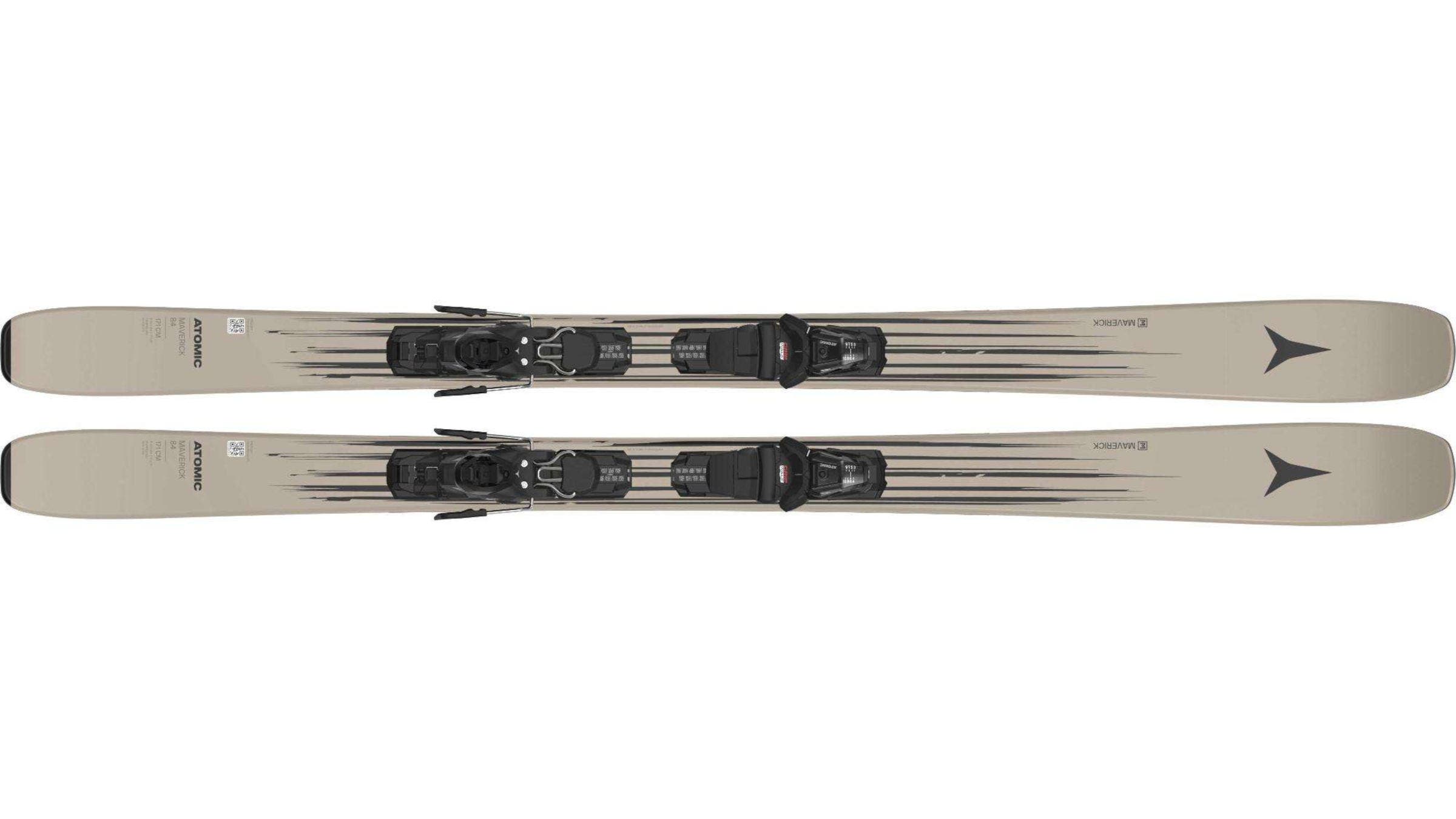
Most Versatile
Atomic Maverick 84
Lengths: 153, 162, 171, 180 cm
Dimensions: 121-84-105 mm
Pros and Cons
+ Performs well in a variety of conditions
+ Inspires confidence at speed
— Not an intuitive carver
If you’re looking for a performance-oriented and affordable all-mountain ski that inspires confidence in a variety of conditions, look no further than the Atomic Maverick 84. “This ski is more stable than my engineer father,” quipped one tester. “If you go hard and fast around the mountain, it won’t let you down, and if you get in the back seat, it’ll help you out. I love how it can flex in the bumps yet stay stiff and smooth enough to resist chatter at speed.”
Testers recommend the Maverick 84 for intermediates through advanced skiers who enjoy making longer turns that come from the ski’s 16-meter turn radius. With an 84-millimeter waist, the Maverick 84 makes no pretense of being a carving ski. While it can hold an edge, it’s not an intuitive carver that will help draw you into a beautiful arc; it also isn’t the most confidence-inspiring tool on ice.
With an all-mountain rocker profile and a lightweight construction, the Maverick is made for maneuverability and stability, not for railing racing turns. But if you’re looking for an affordable ski that’s versatile enough to tackle more than just groomers, the Maverick 84 is a sensible choice that even an engineer father would support.
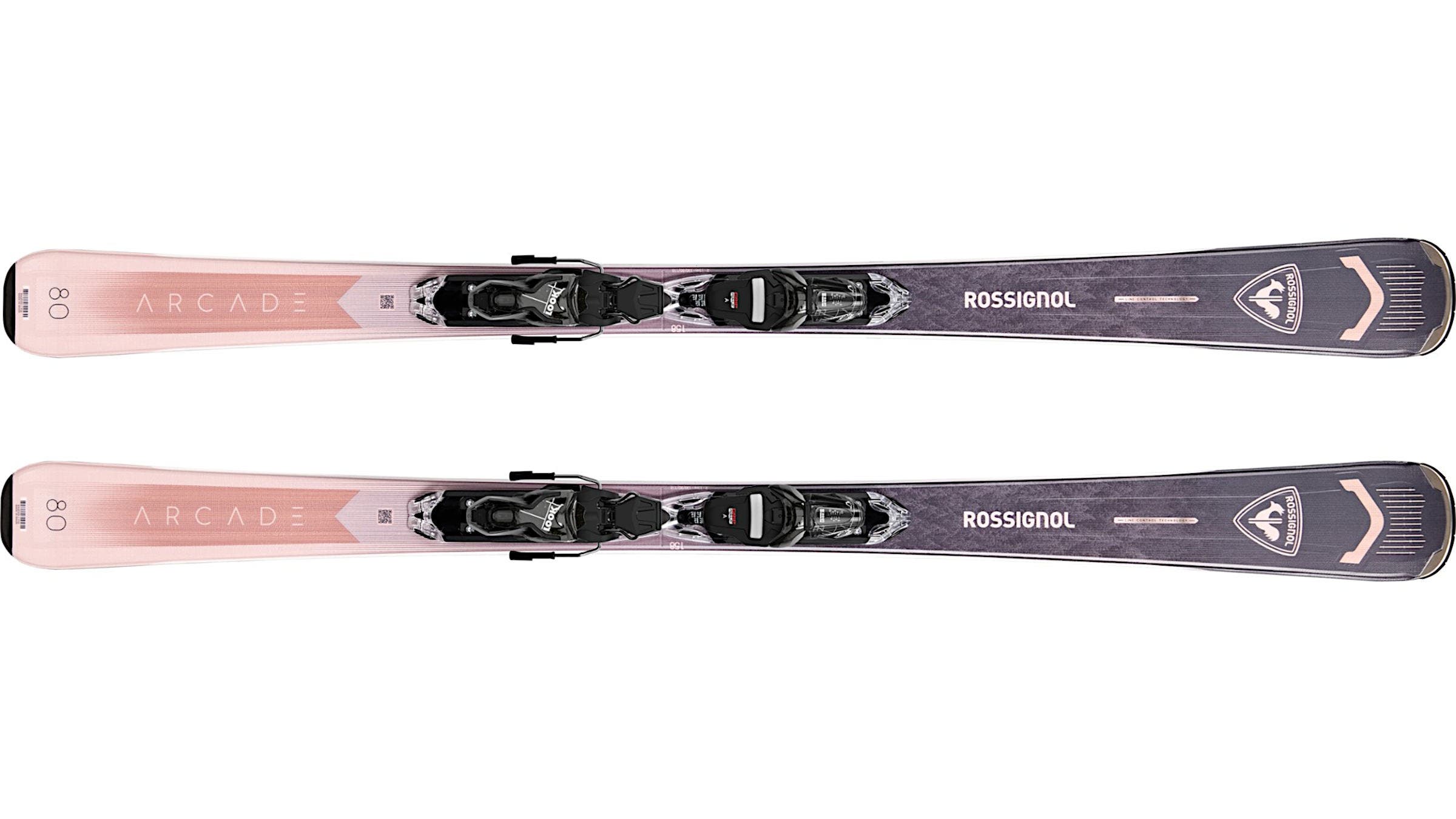
Best for Women
Rossignol Arcade W 80
Lengths: 134, 142, 150, 158, 166 cm
Dimensions: 130-80-118 mm
Pros and Cons
+ Easy to initiate turns
+ Quick and responsive
— Might be too soft for stronger skiers
The Arcade W 80 is a feel-good ski that performs well just about anywhere, making it our top choice for women still working on their skills and confidence on the hill. “An intermediate aspiring to ski all terrain will find this bridge between a carving and frontside ski to be their best friend,” said one tester. “It has so many qualities: versatility, stability, carving acumen, and an ability to handle different terrain and snow conditions.”
The Arcade W 80 earned top scores for quickness, followed closely by carving. When asked where it performs best, testers simply said, “everywhere.” “It shines on groomers but held well in variable snow and moguls, too,” noted another tester.
This ski wants to be on edge. Its big rockered tip and oversized sidecut make turn initiation effortless, which is why it feels so intuitive for aspiring carvers and short-turn enthusiasts. The construction includes a vibration-damping layer that helps the ski stay composed in variable snow and on edge, and inspires confidence for those still working on their skills.
Strong skiers, however, may find it too soft for high-speed turns. At faster paces, testers noted some tip chatter. But for intermediates who like the idea of carving clean arcs and exploring mixed terrain, the Arcade W 80 offers a forgiving, confidence-boosting ride that feels smooth and easy all day long.
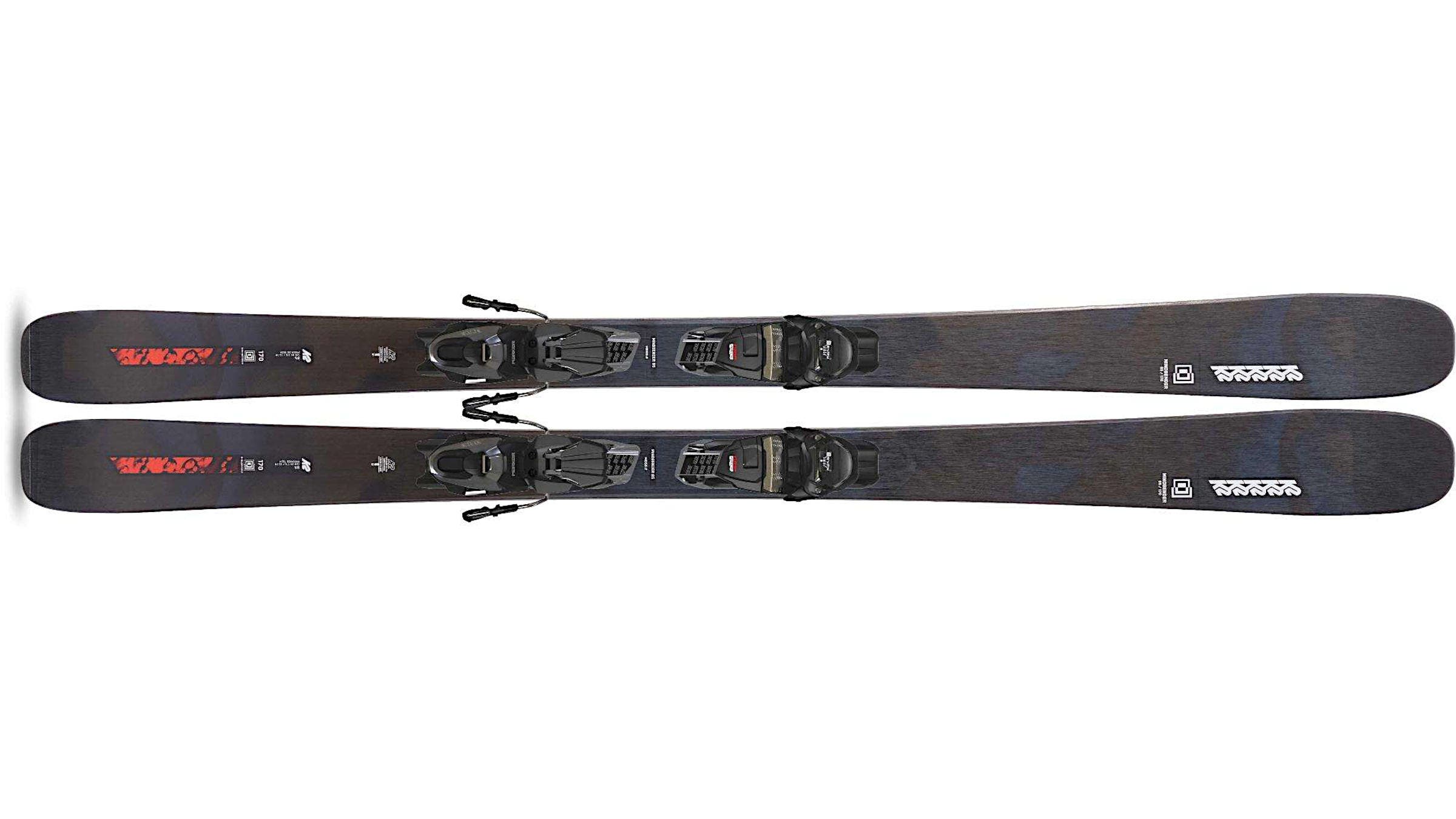
Best Ski to Grow With
K2 Mindbender 85
Lengths: 156, 163, 170, 177 cm
Dimensions: 128-85-116 mm
Pros and Cons
+ Easy to maneuver
+ Responsive
— Lacks rebound energy, not for aggressive skiers
Ready to commit to skiing without taking out a loan? The K2 Mindbender 85 delivers peace of mind—and room for your skills to grow—making it our testers’ top pick for solid blue-square skiers. With high marks for carving and responsiveness, its 85-millimeter waist shines in short-radius turns on groomers, modest moguls, and cut-up snow along the trail edges—all without demanding superhuman strength or lightning-fast reflexes.
“Even if you’re a backseat skier with no intention of listening to an instructor telling you to ‘get forward,’ this ski will hold your hand into the sunset,” said one tester. “Everyone can benefit from how solid it feels in short-to-medium carved turns.”
Testers found the MIndbender 85’s sweet spot centered and intuitive, offering a quick, predictable feel whether you’re rolling it onto edge or pivoting side to side. It won’t punish an upright or slightly backseat stance, but when you do get forward, it rewards you with added agility and edge grip.
This isn’t a ski for advanced or expert skiers chasing high-performance turns—it lacks the rebound energy and snappy feedback of more aggressive skis, trading liveliness for dependability. Still, for intermediates looking to buy their first pair of skis, the K2 Mindbender 85 is a confidence-building, affordable entry point into the sport.
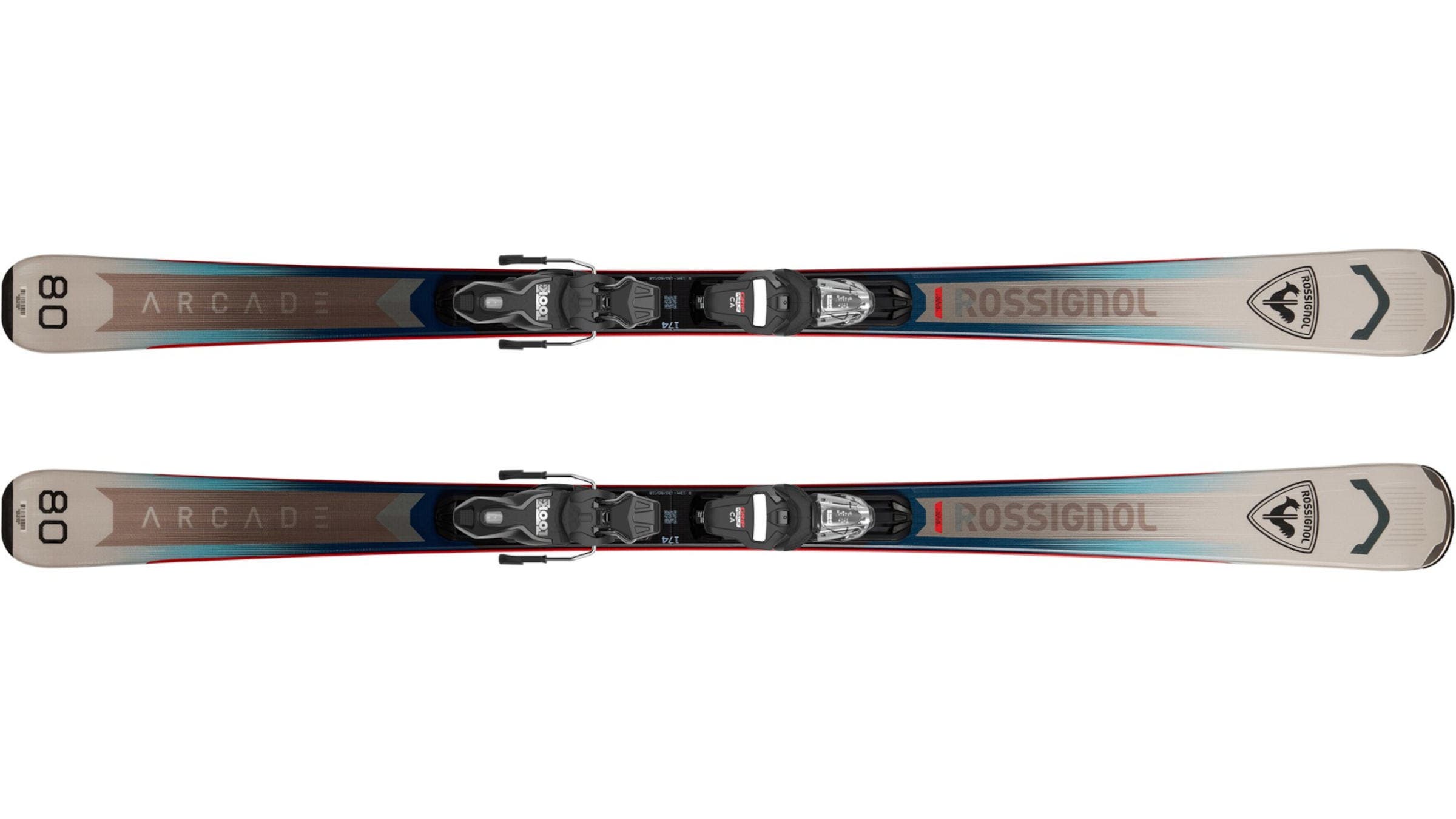
Best Carver
Rossignol Arcade 80
Lengths: 142, 150, 158, 166, 174, 182 cm
Dimensions: 130-80-118 mm
Pros and Cons
+ Intuitive carver
+ Loves short radius turns
— Tips can chatter at speed
If you want to advance your carving skills, the new Rossignol Arcade 80 can help. “This is a fantastic intermediate carving ski, especially for the price,” said one tester. “It’s a solid and snappy ski that will reward frontside skiers who want to work on their technique.”
With a snappy 13-meter turn radius, a voluminous rockered tip, and an oversized sidecut, the 80-millimeter waisted Arcade 80 is designed to make turning a cinch. That makes this ski our testers’ top choice for intermediates looking for a fun, easy ski that can coax them into a carved turn and help them progress their skills, especially on groomers.
There is no metal in the Arcade 80, but Rossignol’s Vibration Absorber System helps to dampen vibration, while a metal rail inserted in the wood core enhances control. This construction increases stability and performance on firm groomers and in variable snow—up to a point. The Rossignol Arcade 80 can’t compete with Rossignol’s higher-performance skis, like the Arcade 84, but it’s not designed to. It’s designed to help intermediates make nice, clean turns and that’s exactly what it does.
More Women’s Skis We Recommend
These women’s skis offer strong alternatives to the Rossignol Arcade W 80.
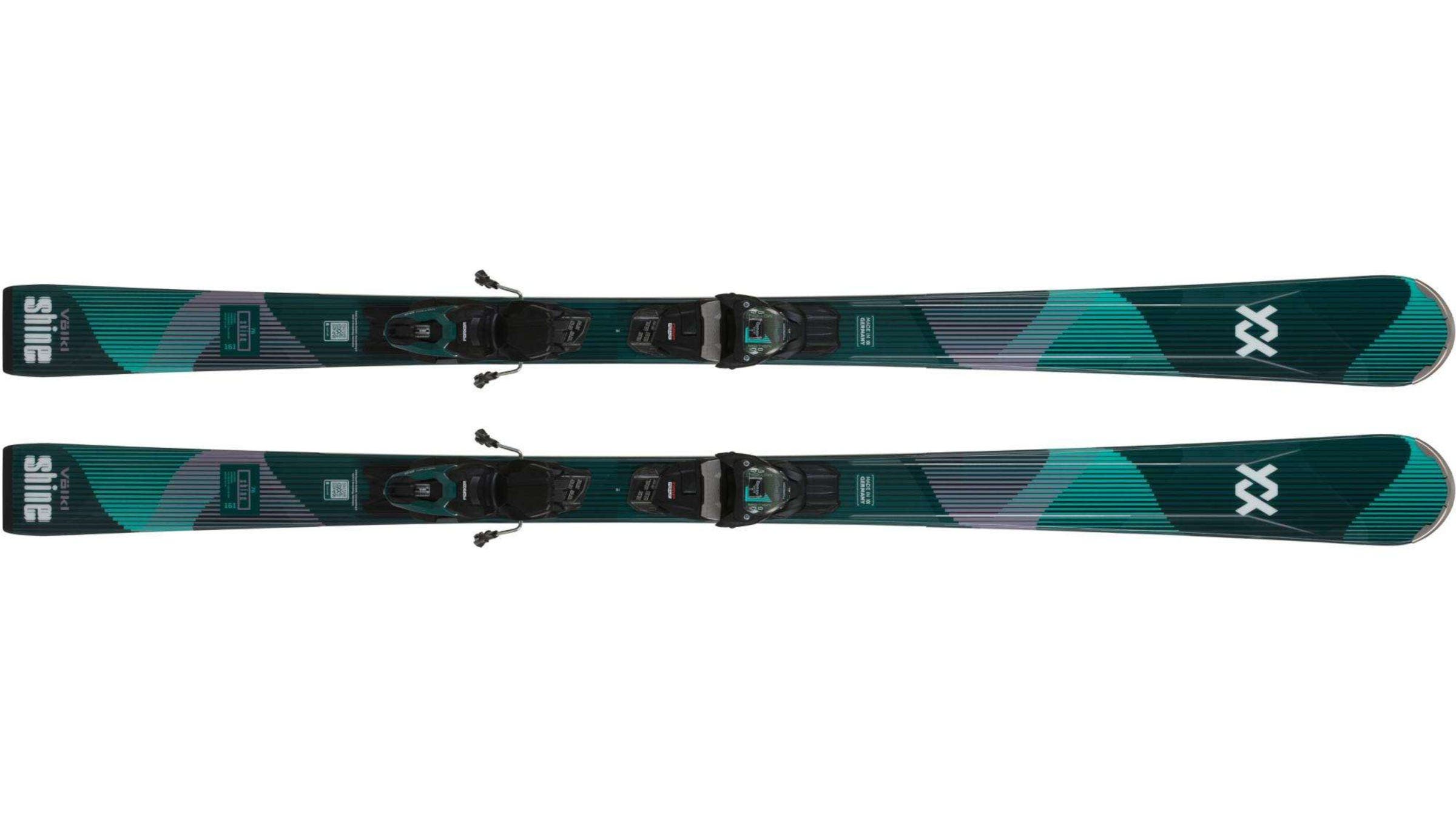
Völkl Shine 76
Lengths: 147, 154, 161 cm
Dimensions: 124-76-105 mm
Pros and Cons
+ Excellent grip on firm snow
+ Stable
— Not as dependable in crud
Winter dry spells can make for firm, unforgiving snow, but the Völkl Shine 76 brightens those hardpack days with the brand’s signature edge grip that inspires confidence on firm snow. Testers praised the Shine 76’s dependability, stability, and carving power, particularly on hard snow.
Positioned as a next-step ski for progressing women, the Shine 76 sits squarely in the carving category. Its 14-meter turn radius allows for smooth, consistent arcs across everything from soft corduroy to icy slopes. A slim, foam-based construction with a central wood core keeps it lightweight while maintaining strong edge hold underfoot.
While it can handle light off-piste ventures, testers noted its limitations in crud and choppy moguls, where the stiff tail demands more active steering. Still, for solid intermediates seeking a lightweight, easy-to-turn carver that excels on groomers, the Shine 76 is a good choice for firm-snow days.
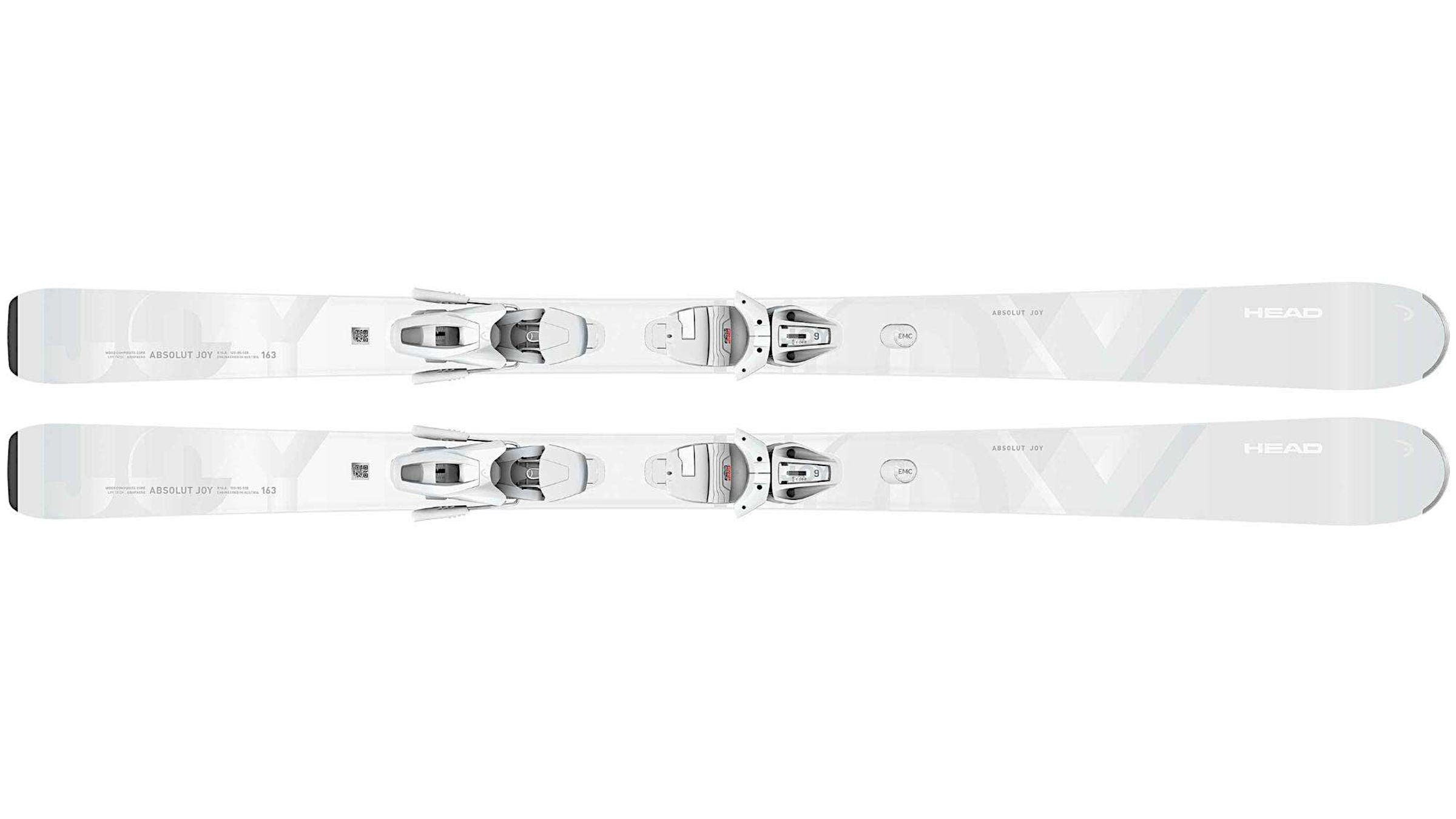
Head Absolute Joy
Lengths: 143, 148, 153, 158, 163, 168 cm
Dimensions: 122-80-108 mm
Price: $825 (with binding)
Pros and Cons
+ Easy to turn
+ Stable and solid
— Feels heavy
Voted “best bang for your buck” by our testers, the Head Absolute Joy packs top-end technology into a forgiving, confidence-boosting package. A longtime favorite in Head’s women’s lineup, this carryover model—with fresh graphics—has helped countless skiers feel more at home on the slopes. During testing at Eldora, Colorado, it earned high marks for hard-snow integrity and stability, but what impressed testers most was its versatility across ability levels. “It’s solid for those who want to start pushing their limits to the next level, but also fun for advanced skiers to take out all day and never tire,” said one tester.
The ski’s 80-millimeter waist and 14.8-meter turn radius make it quick and responsive, while the lightweight core—enhanced with graphene for strength—adds a smooth, stable feel. Though testers noted it can feel a bit heavy in moguls, that weight helps it cut confidently through slush and crud. Whether you’re progressing your carving skills or want a smooth, dependable frontside cruiser, the Head Absolute Joy is a smart, satisfying investment.
Best Intermediate Skis Comparison
Compare the best skis for intermediates side by side.
| Ski | Price | Waist Width | Pros | Cons |
| Dynastar M-Cross 78 | $650 | 78 mm | Intuitive carver; light and nimble | Chatter at high speed |
| Atomic Maverick 84 | $600 | 84 mm | Versatile; stable | Not a natural carver |
| Rossignol Arcade W 80 | $650 | 80 mm | Easy to turn; quick and responsive | Might be too soft for strong skiers |
| K2 Mindbender 85 | $600 | 85 mm | Easy to maneuver | Lack rebound energy |
| Rossignol Arcade 80 ($650) | $650 | 80 mm | Easy carver; easy to turn | Not as stable at speed |
| Völkl Shine 76 | $680 | 76 mm | Excellent grip on firm snow | Not as dependable in crud |
| Head Absolute Joy | $699 | 80 mm | Easy, stable, solid | Feels heavy |
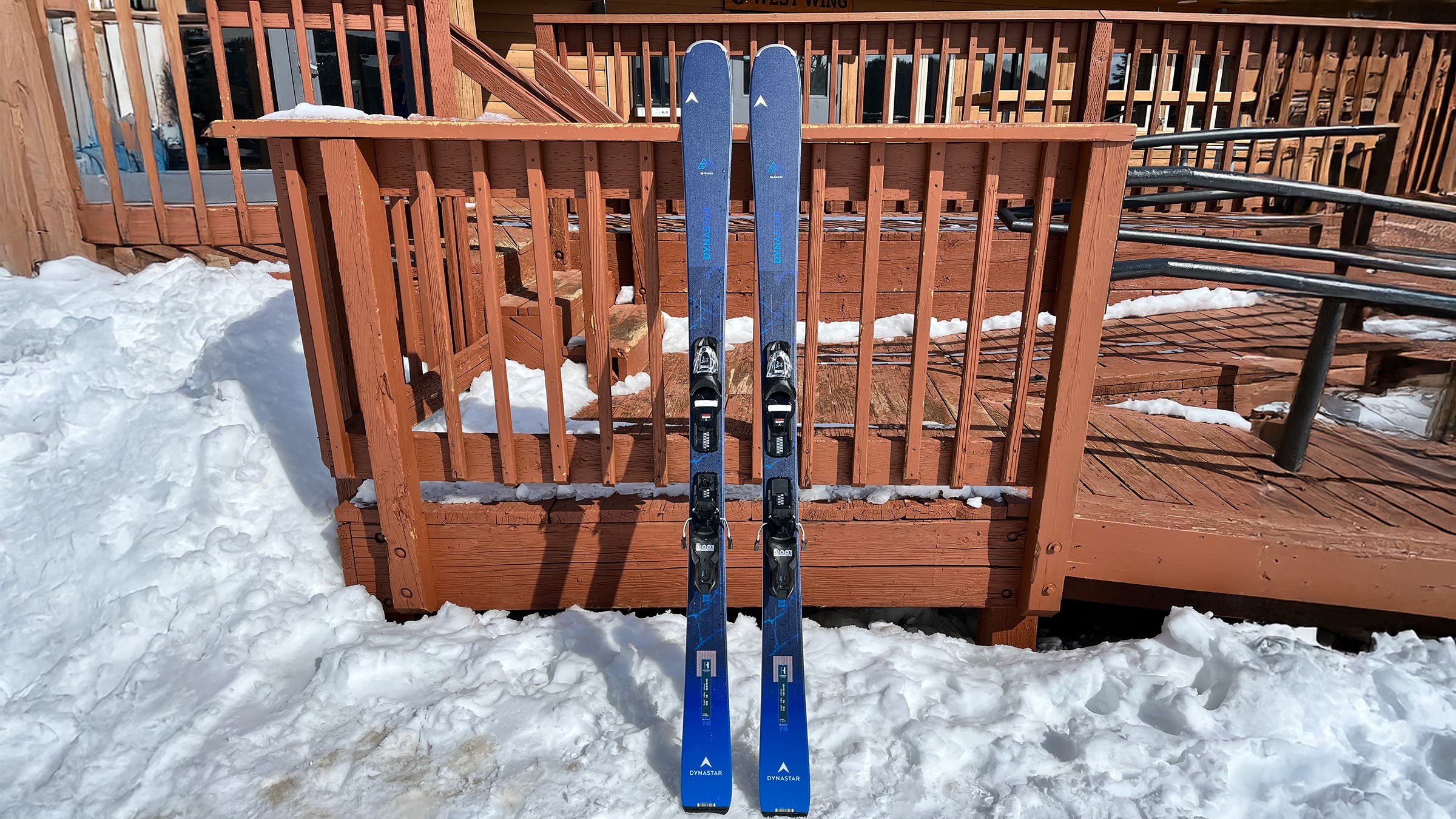
Frequently Asked Questions
What’s the best ski for intermediates?
After skiing 14 skis designed for intermediate skiers, our testers recommend the Dynastar M-Cross 78 as the best ski for intermediates. It’s affordable but still offers great performance, making it an entry-level ski that can help you develop your skills and confidence on the slopes.
What type of skis are good for intermediates?
The best skis for intermediates are lighter-weight, narrow all-mountain skis with waist widths between 70 and 90 millimeters and a bit of shape to help you initiate and hold turns. These “frontside” skis are ideal for groomers, with just enough versatility for moguls and trees once you’re ready to progress there.
What’s the difference between intermediate skis and expert skis?
Skis designed for intermediate skiers tend to be more affordable and lighter than skis designed for experts because they use cheaper materials. This is not to say that these skis don’t ski well—they’re ideal for intermediates who ski at moderate speeds and primarily push or pivot their skis through a turn (as opposed to carve on edge).
Skis designed for advanced and expert skiers tend to contain heavier materials like metal and reinforced sidewalls for enhanced stability at speed, better energy transfer, and more precise edging performance.
How long should skis be?
It all depends on your physical build, skill, and skiing aspirations. The best way to determine the right ski length for you is to visit your local (and reputable) ski shop and talk to the pros. If that’s not an option, then a very general rule of thumb is that intermediate skiers should consider skis that are between chin and nose height.
A shorter ski is easier to turn and control, but offers less stability at speed and in variable snow conditions. So if you’re an intermediate with big skiing aspirations, you might want to consider a slightly longer ski that you won’t outgrow in one season.
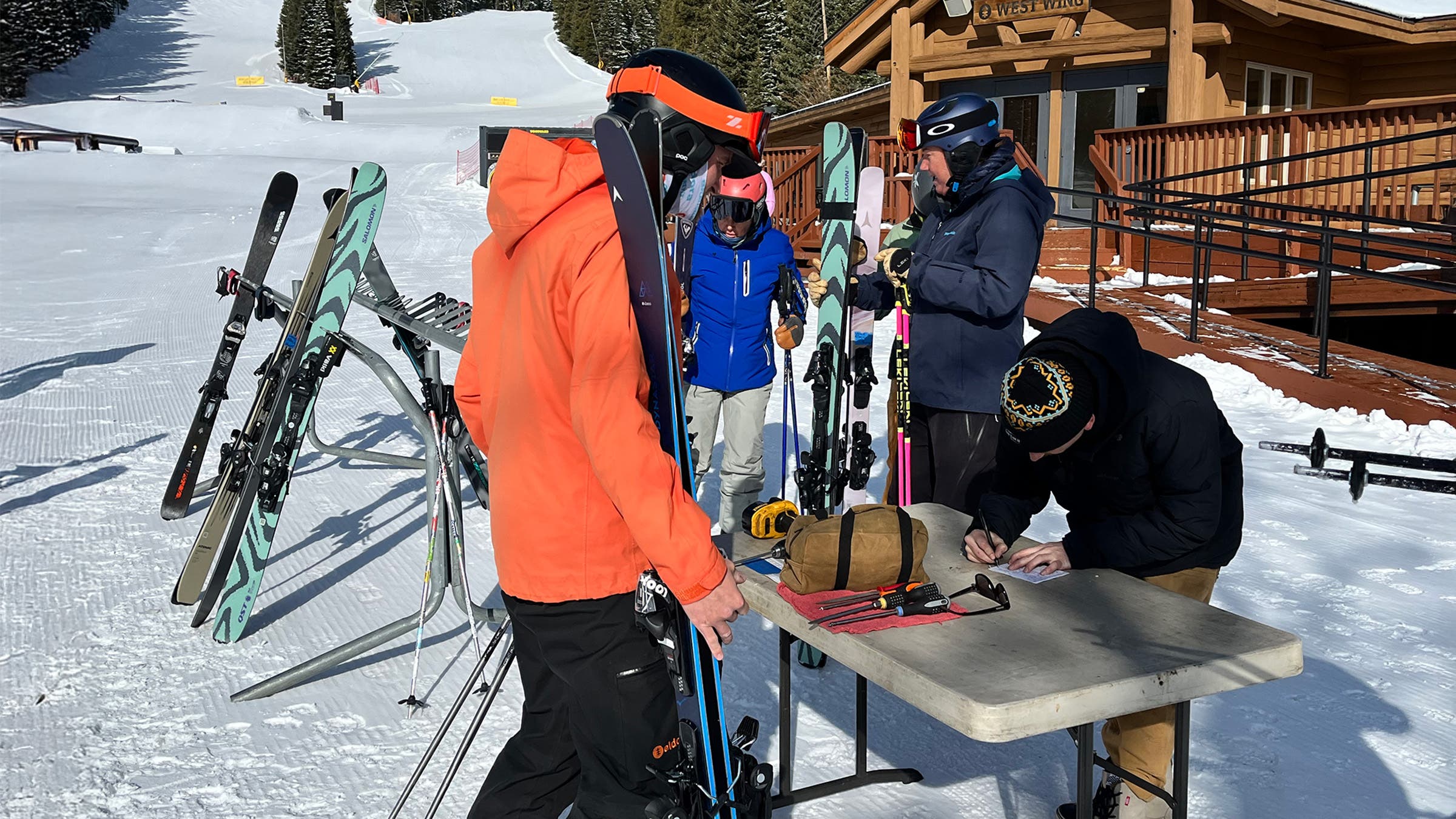
How We Test the Best Skis for Intermediates
Number of skis tested: 14
Number of testers: 10
Testing location: Eldora Mountain, Colorado
Average tester: Age: 37 | Height: 5’7” | Weight: 144 lbs
Every season, Outside and SKI host a week-long gear test, inviting a team of seasoned industry professionals—ski instructors, shop employees, coaches, and outdoor gear experts—to put more than 150 pairs of skis through their paces.
Our crew of testers skis every model and evaluates each one’s strengths, weaknesses, target skier, and ideal terrain and snow conditions. For intermediate skis—also called “value” skis—that means focusing on how well they perform primarily on groomed runs and for novice skiers.
Testers assess edge hold, stability at speed, and responsiveness from edge to edge. Immediately after each run, they record both quantitative scores and qualitative impressions on digital scorecards. From there, our editors analyze the data and synthesize tester feedback to create authoritative, real-world reviews of the best skis on the market today.
Meet Our Lead Tester
Krista Crabtree
Krista Crabtree grew up in New Hampshire skiing every winter weekend with her family. After racing NASTAR at age 5, she was hooked on racing. Crabtree raced for Bates College in Maine. After college, Crabtree coached at Ski Club Vail in Vail, Colorado, and taught at Vail Valley Ski Academy.
Over the past two decades, Crabtree launched a freelance writing career, writing for publications such as SKI, Outside, NSAA Journal, and 32 Degrees. She started She Skis Women’s Ski Testing Clinics in Vail, the first ever consumer-based ski testing clinic. Along with testing skis and writing reviews for SKI/Outside, Crabtree currently runs the women’s program at Eldora Mountain Resort, coaches for Vail’s Her Turn clinics, organizes women’s ski clinics such as the Silverton Women’s Big Mountain Weekend, and coaches for the Eldora Mountain Ski Team and the Nederland High School Ski Team
More from the 2026 Winter Gear Guide
The Best All-Mountain Skis
The Best Snowboard Boots
The Best Men’s Fleece Jackets